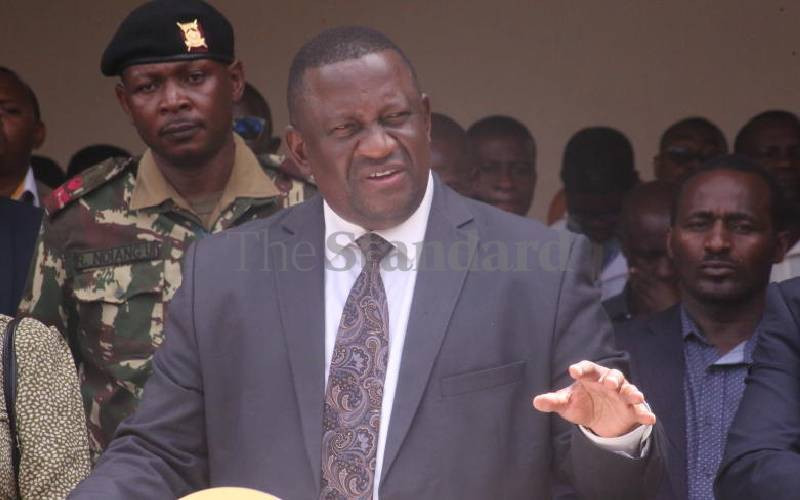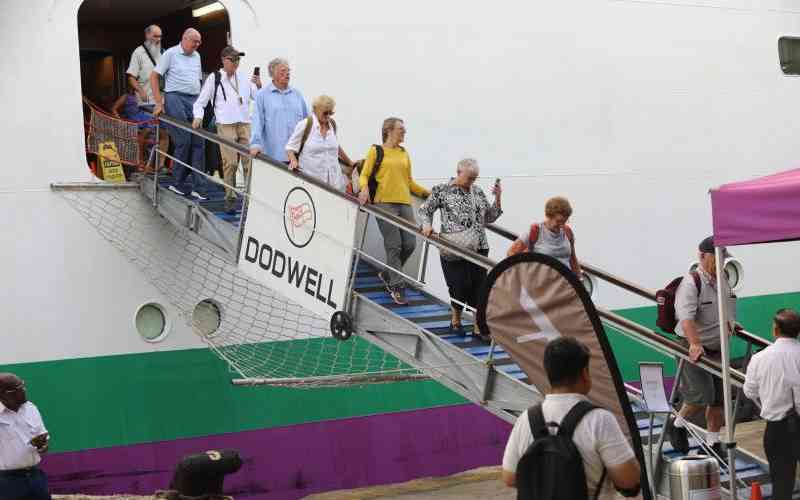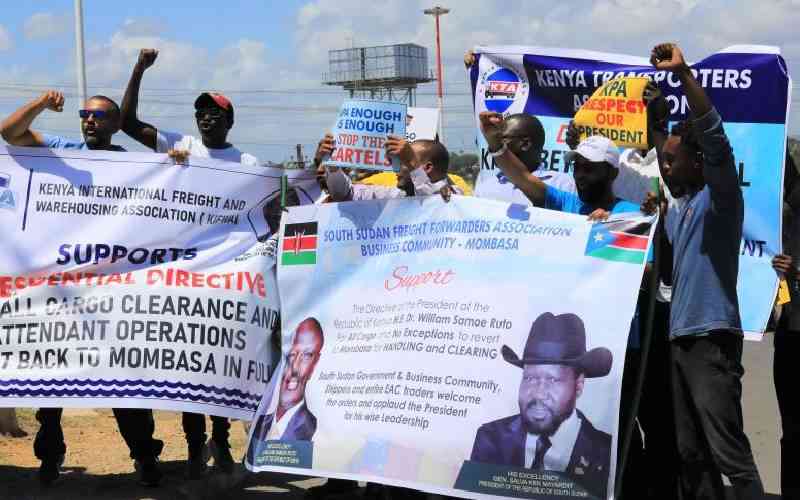 |
|
Mourners carry the body of Prof Ali Mazrui along Mombasa Nkurumah Road in Mombasa on Sunday. (PHOTO: MAARUFU MOHAMED) |
Thousands of mourners from across the world yesterday thronged a centuries-old crypt near the historic Fort Jesus in Mombasa's old town to witness an emotional burial of globally celebrated scholar Ali Alamin Mazrui.
Prof Mazrui, who died in the United States on Monday last week was hailed as an outstanding personality and international citizen who placed Kenya on the global map through selfless and outstanding scholarship.
The professor's remains were flown into Mombasa International Airport early yesterday aboard a Turkish Boeing 737 Airliner that flew direct from Istanbul, Turkey, with his family.
His previously unknown family was seen by most residents of Mombasa for the first time yesterday when the deceased's wife, Mariam and sons Farid Chinedu and Harith Okechukwu accompanied his remains.
Nothing was said about the late Mazrui's first wife Molly Vickerman and their three children-Jamal, Al'Amin and Kim, who did not attend yesterday's ceremony. The late Mazrui divorced Molly close to four decades ago.
Prayers for the departed intellectual were led by former Chief Kadhi of Kenya Sheikh Kassim at the Mbaruk Mosque before the body was interred at the 900-year-old Mazrui family grave yard near Fort Jesus Museum at 11.10am.
Kassim led the final prayers for the fallen scholar at 11.35 at the graveyard in a Muslim burial conducted at the ancestral site in accordance with his wishes.
A big crowd filled the walled and leafy cemetery as the mourners braved the sweltering heat to pay their last respects to the academic icon.
From the mosque where prayers took about 1 hour and 15 minutes, Kassim said Prof Mazrui showed so much love for his country and wished to be buried in Mombasa.
"He loved his country and only had a Kenyan passport. He was a talented scholar who influenced the world," Kassim said.
Mourners carrying the bier snaked their way from the mosque through Mwenye Aboud Road, Nkrumah, Treasury Square, Fort Jesus and Ndia Kuu before entering the Mazrui graveyard.
Mombasa County Government mounted posters along the route reading: "End of an Era, Professor Ali Mazrui 1933-2014."
The body arrived in Mombasa from New York at 2.30 am. Mazrui's nephew and leading scholar Alamin Mazrui who accompanied the body from the US, said the renowned scholar had written a letter before his death, expressing his wish to be buried beside his father Sheikh Al-amin bin Ali Mazrui.
Prof Amin sobbed in the mosque as he narrated how his uncle gained his voice a few weeks before his death and told him he was losing the long fight for his life in a US hospital.
IN ATTENDANCE
The burial was attended by Mining Cabinet Secretary Najib Balala, Majority Leader Adan Duale who conveyed the government message, Chief Justice Willy Mutunga, Mombasa Senator Hassan Omar and Governor Hassan Joho, Mombasa County Commissioner Nelson Marwa, Lamu Senator Abu Chiaba and former Constitution of Kenya Review Commission Chairman Yash Pall Ghai, among local and foreign scholars.
Prof Ghai mourned Mazrui, saying he broadened the thinking of Africans towards the global view and scholarly development.
Ghai asked Kenyans to emulate the scholar and embrace scholarly development.
Stay informed. Subscribe to our newsletter
Umma University Vice Chancellor Shaukat Abdulrazak described Mazrui as a thinker and disciplined scholar who freely spoke his mind.
"We need to emulate his research and write to honour him," said Prof Abdulrazak.
Scholars were set to attend a public lecture in honour of the fallen scholar at the Aga Khan Academy in Mombasa yesterday afternoon.
Prof Alamin travelled with Mazrui's widow and sons. Others in attendance were scholars Betty Wambui, Goreti Mugambwa, Ricardo Laremont, Seifudein Adem and Mohamed Bakari
"We commend the national government, Mombasa county government and Turkish government for facilitating the team which travelled with the body. The Governments ensured speedy clearance and smooth travel," Prof Alamin said.
He said the messages of condolence received proved that Mazrui was a global writer whose contribution touched the world.
Mazrui, 81, is survived by widow Paul Mariam Uti and five children –Jamal, A'Amin, Kim Abubakar, Farid Chenedu, Harith Ekenechukwu and adopted daughter Grace Jennifer.
The scholar had his first three children with his first wife Molly 'Muna' Vickerman, an academic whom he married in 1962 before marrying Mariam from Nigeria in 1991.
The scholar's family members yesterday displayed some of the more than 30 books the outspoken professor wrote in his lifetime including 'The Africans Triple Heritage' and 'Violence of Thought' as they celebrated his unparalleled achievement.
The 'Africans Triple Heritage' was featured in a documentary by the British Broadcasting Corporation and in America by the Public Broadcasting Service.
The professor is also credited for publishing more than 100 academic papers during his sterling career.
Kassim said Prof Mazrui was a liberal mind and often landed in trouble with the ruling class and that he had to flee from Makerere University in Uganda where he taught for 10 years and was chair of the Department of Political Science in 1971 to escape the wrath of Idd Amin's dictatorial regime.
Family and friends remembered the renowned professor's humble journey from a makuti (palm fronds) school structure at Arab Primary School, now Serani, where he received his early education between 1940 and 1949.
ISLAMIC SCIENCE
His classmate Mohamed Hyder described him as a great mind who was an accomplished debator and excellent Kiswahili and English speaker and writer.
"In Standard Two, Mazrui stunned me when he said he would like to be a writer when he grows up. That was the time when most of us wanted to be teacher, lawyer or doctor because these were well paying careers," Prof Hyder said.
He said Mazrui who would often invite him to the Institute of Global Cultural Studies in the USA, which he served as director, played table tennis while in school and was one of his best friends.
According to family members, Mazrui later moved to Arab Secondary School, the present Khamis Secondary School and was immediately employed in a clerical position at a tender age of 15 years at the Mombasa Institute of Muslim Education (Miome), now Technical University of Mombasa.
He at the same time served as a correspondent for Mombasa Times and a weekly half-hour programme as a storyteller in Kiswahili at a local radio station- Sauti Ya Mvita.
Mazrui comes from a long line of family intellectual tradition in East Africa. The Mazrui family had prominent figures who ruled Mombasa in the 18th century. After the defeat of the Portuguese, the Omani Arabs controlled the Coast through the locally-based hereditary governors. His father, Sheikh Al-Amin bin Ali Mazrui who lived between 1801 and 1947 was regarded as one of the most distinguished scholars of Islamic science throughout the East African region.
Family members said Mazrui's father authored many books on Islam, in both Arabic and Kiswahili and published a regular Kiswahili periodical –Al-Islah- often with a reformist agenda.
He also served as Kenya's Chief Kadhi. His grandfather, Sheikh Ali bin Abdallah Mazrui (1825-1894) was equally renowned and his reformist ideas often at odds with the authorities, ultimately leading to his confinement by Sultan Barghash of Zanzibar.
Mazrui was described as an average student in his early education who scored grade three and soldiered on to the halls of fame.
It was in the course of his years at Miome that he met the then governor of colonial Kenya Sir Philip Mitchel who was impressed by his brilliance and excellent English and Kiswahili speaking skills.
Sir Mitchel facilitated his scholarship to Huddersfield Technical College in England in 1955 and later University of Manchester, where he obtained a bachelor of Arts degree with a distinction.
PRESIDENTIAL AWARDS
He then proceeded to Columbia University, New York, for his Masters degree and later to England to pursue his doctorate degree at Exford University.
The global reception and influence of his work led the Aermican journal 'Foreign Policy, and the British journal 'Prospect' to name Mazrui among the top 100 public intellectuals alive in the world.
Mazrui was earlier elected as an icon of the twentieth century by Lincoln University in Pennsylvania and in 2007, he became the recipient of the Living Legends Award sponsored by the Economic Community of West African States and African Communications Association.
In Kenya, he received two presidential awards for his intellectual contribution: Commander of the Burning Spear (First Class) and National Hero (Shugaa) recognition.
At one time, Mazrui who has taught in five continents served as chancellor of the Jomo Kenyatta University of Agriculture and Technology.
 The Standard Group Plc is a
multi-media organization with investments in media platforms spanning newspaper
print operations, television, radio broadcasting, digital and online services. The
Standard Group is recognized as a leading multi-media house in Kenya with a key
influence in matters of national and international interest.
The Standard Group Plc is a
multi-media organization with investments in media platforms spanning newspaper
print operations, television, radio broadcasting, digital and online services. The
Standard Group is recognized as a leading multi-media house in Kenya with a key
influence in matters of national and international interest.
 The Standard Group Plc is a
multi-media organization with investments in media platforms spanning newspaper
print operations, television, radio broadcasting, digital and online services. The
Standard Group is recognized as a leading multi-media house in Kenya with a key
influence in matters of national and international interest.
The Standard Group Plc is a
multi-media organization with investments in media platforms spanning newspaper
print operations, television, radio broadcasting, digital and online services. The
Standard Group is recognized as a leading multi-media house in Kenya with a key
influence in matters of national and international interest.









